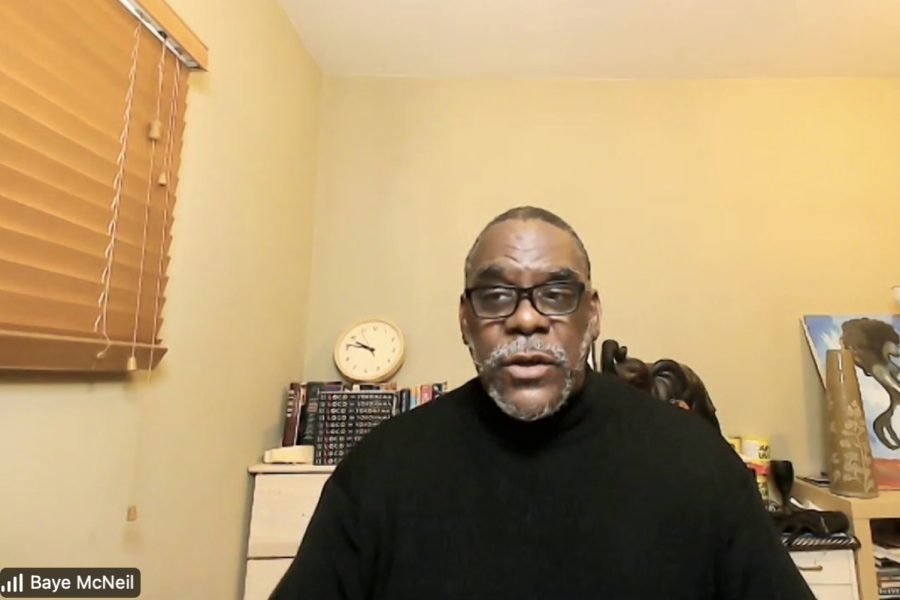What Does BLM Activism Look Like Across the Sea?
Writer and Activist Baye McNeil spoke at COD’s 30th Annual Asia Symposium this past week to talk about his experience as an expat in Japan.
April 21, 2022
In 2004, Baye McNeil moved to Japan to start a career in teaching. After living a few years in Japan, McNeil discovered his voice as an anti-racism, pro-Black activist. He started a blog, called Loco in Yokohama, and began discussing race issues in both Japan and the United States. McNeil dedicates his time to addressing diversity issues in Japanese media; everything from protesting the blatant use of blackface to dismantling the exclusive bias of what it means to be Japanese. Most noticeably, McNeil has spoken out against the white-washing of tennis star Naomi Osaka in Japanese media.
On April 18, McNeil attended COD’s 30th annual Asia Symposium– Co-Sponsored by College of DuPage’s Asia Committee, Africa & African Diaspora Committee and Center for Student Diversity, Equity and Inclusion– to talk about his experience as a writer, activist and Black person living in Japan.
McNeil talked about his upbringing in Brooklyn, N.Y. and described how his mother got him involved in activism at a young age.
“My mother’s first act of activism, that I’m aware of,” he said, “was to make sure I was proud of Black history and Black culture, which would be damn near impossible in the New York public education system.”
To combat this, his mother sent him to a private school that carried that same ideal: to form a society of Black Americans who were proud of Black history and Black culture. In doing so, McNeil found himself at the center of protests at the young age of seven.
Although McNeil had extensive knowledge and experience with activism, that was not the reason he moved to Japan.
“I didn’t come to Japan seeking opportunity or because I had any particular fascination with the culture. And I certainly didn’t come here expecting to get involved with any activism,” he said. “I came here to escape from an atmosphere that labeled me ‘alien’ and questioned my basic humanity by constantly and consistently putting me in a position where I had to represent an entire race of diverse people.”
Although McNeil admitted he had found the experience similar between the U.S. and Japan, it was easier to dismiss the alienation.
“It was easier to get distracted here because everything was so new,” McNeil said. “And a lot of it was rather pleasant. I had no intention of staying here 18 years, but once Japan gets its hooks into you, sometimes there’s no wiggling free.”
That illusion of pleasantness broke when McNeil began noticing the Japanese citizens around him would often leave an empty seat beside him on public transportation.
“A great deal of what Japan hit me with hammered home the fact that I was just much an alien here as I was back in America,” he said. “One of my major grievances was this phenomena known as ‘the empty seat.’”
The “empty seat” phenomena, as McNeil went on, describes the acts of Japanese citizens keeping their distance from foreigners, bluntly trying to not associate with them. This phenomena is what McNeil credited to the creation of his blog where he wrote about his thoughts on racism and xenophobia in Japan.
“I had been in Japan for four years at the time, in 2008, that I started documenting the good and the bad,” he said. “I wrote some very introspective and personal posts, because that’s the only way I know how to write. Much to my surprise, considering the number of other Japanese blogs out there, it really took off.”
McNeil called his blog a baby step into activism. Not long after, McNeil got a job working as a columnist for the Japan Times. He dedicated his column, titled “Black Eye,” to telling stories about Black people in Japan. Although McNeil began talking about issues regarding race, he recalled his first act of activism as the time he successfully petitioned against a Japanese broadcast from airing a performance with the performers wearing blackface.
McNeil was adamant that the racism he faced in Japan, though much less violent than the racism he faced in the U.S., still was worth dismantling and combating.
“For many, unintentional racism is not racism. Or worse, it’s forgivable,” McNeil said.
McNeil still works as a columnist for the Japan Times. He is also lecturing and working as a consultant for Japanese media companies. Although there is still a lot of work to be done, he said he feels accomplished in what he has achieved.
“Many people equate activism with protests, boycotts and rallies, but sometimes something as simple as a document can be activism,” McNeil said.
For information about McNeil, check out his website as well as his two published books.




















